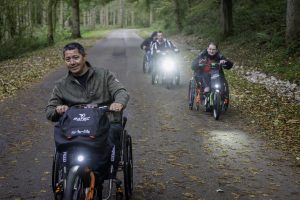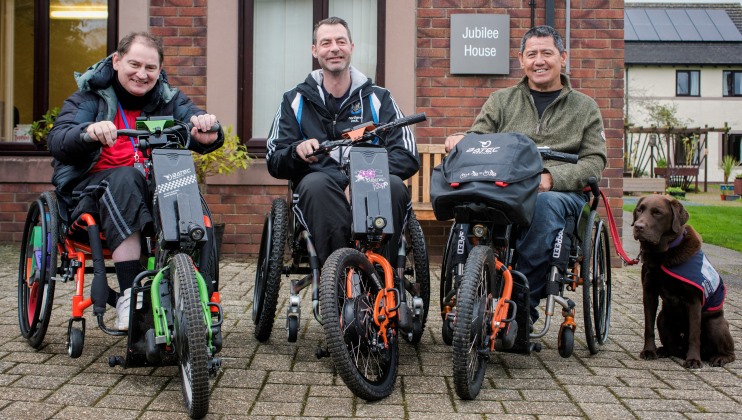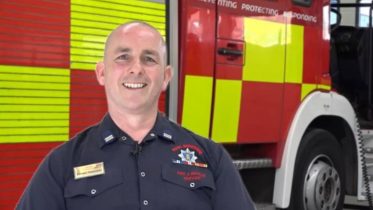Last month Jubilee House hosted the Charity’s first Spinal Cord Injury Week, a targeted week for beneficiaries who have a spinal cord injury either through trauma, accident or disease. With the aid of spinal cord injury professionals, the main focus of the week was peer support, as well as the sharing of knowledge and skills between both our staff and clients. The aim of the week was to ensure that those taking part would be able to get the most out of their exercise-based programmes and better self-manage their conditions.
Louise Cannon, one of our Physiotherapists who was integral to the set-up of the week, said;
“Not everybody who has a spinal cord injury goes through a spinal cord unit so they might not necessarily get that information from an acute setting and they build it up from lots of different areas. We thought if we concentrated that together and bought in some of the key components around nutrition, pressure care, bladder and bowel care management and exercise, plus benefits of peer support, psychological support and wellbeing it would be a very useful and interesting development.”
The week, which was attended by four beneficiaries, was arranged after our clinical teams saw an increase in people coming to our centres with differing spinal cord injuries.
Former Station Manager Peter Lau, was paralysed three years ago when his bike collided with a car and in 2015 received the Beneficiary of Courage award at our Spirit of Fire Awards. Since then he has visited Jubilee house a number of times working on his core development. He admits his mental health wasn’t always his top priority during visits but attending spinal cord injury week has given him the opportunity to meet other people dealing with the same issues and who all have empathy for each other.
“That’s the biggest value this week, bringing people together who get each other.” Peter Lau
He said; “[My core] has developed considerably but the bit I probably underestimated was the change in my wellbeing psychologically. As much as I had been concentrating on the physical side, the mental side of how a life changing injury affects you was something I neglected.
“It’s an excellent opportunity really to meet people who are in a very similar position to me, who deal with the same problems that I have to deal with day-to-day and to learn their approach to life and how they manage a spinal cord injury.”
He continued; “I think prior to this week you may well feel you are a little bit isolated as a serving or ex-firefighter with a spinal cord injury, but actually you are not isolated, there are four other people in this facility now who have a similar background, similar injury. We’ve got empathy and we can learn from each other. That’s the biggest value this week, bringing people together who get each other.

Peter Lau using a Batec attached to his wheelchair.
“Put us in a room and it’s like we are a brotherhood of people that just get it, we all get each other’s issues, we can support each other’s issues. Add to that the amazing staff we get here and the specialist knowledge that we are gaining this week, it’s win win, it’s really making a difference I think.”
The week, also included sessions delivered by Cyclone, a rehabilitation and training specialist. The equipment Cyclone brought enabled our beneficiaries to independently leave the grounds of Jubilee House.
Louise added; “A specific session unique to this week are the people that are from the company Cyclone who brought up machines like Batecs which is essentially a bike that you can attach to a wheelchair. This allows people to get out independently, to get up curbs safely and out on rough terrain and gives them a lot of freedom and independence.
“Seeing people use those machines, its unquantifiable when you see somebody’s face, when they have always relied on maybe being pushed somewhere or they are under somebody else’s volition. You can’t go somewhere because of the terrain and you can’t go somewhere because you couldn’t self-push for that long, what would happen if I was on my own? When you see the freedom that something like that offers it can’t actually be measured.
“It’s a lot harder to measure somebody’s happiness than it is to measure somebody’s range of movement within their joint, and it’s a lot harder to measure what something like peer support can bring to people.”



